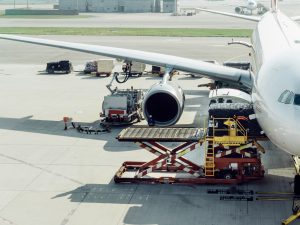The US administration lowered its additional tariffs on China from 145% to 30%, while China responded by decreasing its tariffs on the US to 10%. This welcome news came too late to reverse a softening in freight rates. The global air cargo spot rate fell -4% year-on-year in May to US$2.44 per kg – the first such decline since April 2024. Xeneta said this could, in part, also be attributed to nearly 20% year-on-year declines in jet fuel costs. According to Xeneta’s Chief Airfreight Officer, Niall van de Wouw, more downward pressure may lie ahead. “Market fundamentals are holding up, but the drop in rates is likely a reflection of declining sentiment and concerns, particularly among airlines, over what will happen once more stability returns to international trade and there is less of a push for the security of airfreight,” he said.
Read More »Tesla leases space in Mumbai’s Lodha Logistics Park
American electric carmaker Tesla Inc. has leased 24,565 sq. ft. of space at Lodha Logistics Park in Mumbai’s Kurla West. The transaction adds to the Elon Musk-promoted company’s steady expansion of its real estate footprint in India—through offices, showrooms, and now warehousing—as it inches towards an expected market entry. The five-year lease was signed between Tesla India Motor & Energy Pvt. Ltd and Lodha Developers, and registered on 16 May. Tesla will pay a starting monthly rent of ₹37.53 lakh, totalling over ₹24 crore over the lease term, according to documents accessed by CRE Matrix, a real estate data analytics firm.
Read More »Kale Logistics Solutions launches Maritime Single Window In Brunei
The Maritime and Port Authority of Brunei Darussalam (MPABD) has announced that its national Maritime Single Window (MSW), designed and implemented by Kale Logistics Solutions (Kale) along with its strategic partner, Primatel Communication Sdn Bhd, has gone live in Brunei Darussalam. The launch was officiated by the Guest of Honour, Yang Berhormat Pengiran Dato Seri Setia Shamhary bin Pengiran Dato Paduka Haji Mustapha, Minister of Transport and Infocommunications and Chairman of MPABD. Yang Mulia Captain (Ret.) Zil Husam bin Haji Abdul Rahman, Chief Executive of MPABD highlighted the launch of the MSW as a milestone in the Sultanate’s continued digital transformation agenda. In his remarks, Yang Mulia Captain (Ret.) Zil Husam stated that “We are taking a major step forward in transforming the way ship clearance processes are conducted in Brunei Darussalam. The implementation of the Maritime Single Window, as mandated by the International Maritime Organization (IMO) under the FAL Convention, allows for the electronic submission, processing, and approval of port clearance information – all through a single online platform.”
Read More »‘Tech-driven, solutions-oriented mindset makes the sector an exciting frontier’
Vaibhav Vohra, Managing Director, Continental Carriers said, “Young entrepreneurs see logistics as a space ripe for transformation. Rather than being deterred by complexity, they’re motivated by the potential to digitize operations, improve efficiency, and create scalable impact. A tech-driven, solutions-oriented mindset makes the sector an exciting frontier. They are integrating automation, EV fleets, smart warehousing, and IoT-based tracking to enhance speed, accuracy, and visibility. Their focus on sustainability and customer-centricity is making logistics more agile and future-ready.
Read More »‘Use innovation to solve inefficiency, modernise processes’
Kunal Maheshwari, Chief Growth Officer, Softlink Global said, “There’s a massive opportunity to transform a traditionally complex, fragmented industry with fresh thinking and technology. Many young entrepreneurs see the opportunity to introduce innovation for solving inefficiencies, modernizing systems, and making a lasting impact in an industry that is widely considered the digital backbone of the global economy. The focus is on adopting a tech-first mindset—using AI, automation, and data analytics to enhance visibility, speed, and cost-efficiency. From hyperlocal delivery models to digitized warehouses and end-to-end tracking platforms, young founders are making logistics smarter, more agile, and customer-focused.”
Read More »Qatar Airways Cargo, Skyways team up to boost digital efficiency
Qatar Airways Cargo has successfully launched host-to-host API integration with Skyways Group, enabling real-time pricing, capacity visibility and instant booking confirmations. “Marking our first customer host-to-host integration in the Indian subcontinent region, this will be rolled out across all our origins where Skyways Group offices are located, bringing seamless e-booking capability to more customers,” said Qatar Airways Cargo in official LinkedIn Post. “With this launch, we are enhancing efficiency, speeding up response times, and making it easier for our partners to do business with us. A big shout out to the amazing teams at Qatar Airways Cargo and Skyways Group for making this happen. It’s always inspiring to see what we can achieve when we work toward a shared vision,” the post added.
Read More »‘Redesigning logistics around speed, sustainability & smart tech’
Chandrima Govil, Director, Activair Airfreight said, “We at Activair & MKF as the 2nd Generation of Freight Forwarders in the family recognise the need to replace outdated processes with agile, tech-driven solutions. The surge in e-commerce, rising customer expectations, and global supply chain disruptions have made logistics a strategic growth area. Activair’s approach reflects this shift—combining years of operational experience with forward-looking innovations in air freight, warehousing, and customs. For this new generation, logistics is not a burden but a platform for meaningful, scalable impact. We are redesigning logistics around speed, sustainability and smart technology. We have adopted, integrated, real-time solutions across the supply chain. In last-mile delivery, we leverage micro-fulfillment and flexible courier networks. Air freight is digitized for faster bookings, transparency, and smarter routing. Warehousing shifts toward decentralized, tech-powered hubs, while IoT-enabled tracking ensures visibility from origin to doorstep. Activair’s evolution reflects this mindset—balancing legacy strengths with digital tools to meet the demands of modern commerce. These innovators view logistics as an interconnected system, driven by data, automation, and customer experience.”
Read More »‘Innovation is fuelled by education emphasizing data science, automation & sustainable practices’
Apeksha Gupta, Head Skilling, VCJ foundation said, “Young entrepreneurs are entering the logistics industry, traditionally viewed as complex, due to vast opportunities for digital transformation. They’re drawn by the e-commerce surge and a market demand for efficiency, seeing challenges as avenues for tech-driven solutions. Their motivation stems from a desire to disrupt and innovate within a sector ripe for modernisation, focusing on asset-light, scalable models. These young founders are rethinking logistics across the board. For last-mile, they’re deploying micro-fulfillment and AI-powered route optimisation. Warehousing benefits from automation and smart inventory. Real-time tracking is evolving with advanced analytics and predictive capabilities. This innovation is fueled by new education emphasizing data science, automation, and sustainable practices, moving beyond outdated perceptions of logistics. This holistic training empowers them to devise out-of-the-box, tech-driven solutions for complex supply chain problems.”
Read More »PHDCCI to host Gati Se Pragati Conclave 2025
Block your dates for PHD Chamber of Commerce and Industry’s (PHDCCI) upcoming Gati Se Pragati Conclave 2025 focusing on driving holistic and accelerated growth for inclusive development and seamless connectivity towards Viksit Bharat 2047. The event will be held at Le Meridian, New Delhi on July 3. Sarbananda Sonowal, Minister of Ports, Shipping and Waterways will grace the event as Chief Guest.
Read More »GEODIS launches AirSmart to enhance sustainable ops
GEODIS has launched GEODIS AirSmart, a new low carbon solution designed to reduce greenhouse gas (GHG) emissions related to air freight by leveraging performance. By selecting the most energy-efficient aircraft and optimising routing, GEODIS AirSmart significantly reduces GHG emissions. Leveraging external flight data and advanced analytics tools, the solution enables smarter routing decisions while enhancing performance. This innovation marks a new step forward in GEODIS’s route to decarbonization and to support its customers in achieving their climate goals. It also aligns with GEODIS’ pledge to reduce absolute Air Freight emissions by 25% by 2030. Emission savings through GEODIS AirSmart are available to all customers via our digital platforms, offering tangible and comparable environmental progress. It’s a unique key differentiator in the Freight Forwarding industry increasingly focused on carbon-conscious performance. “We’re thrilled to introduce the launch of GEODIS AirSmart, our new innovative solution that combines high performance with reduced emissions in Air Freight. It’s smart, it’s sustainable, and it’s a game-changer for GEODIS and our customers,” said Henri Le Gouis, EVP, Global Freight Forwarding at GEODIS. GEODIS also plans to expand its maritime offering by deploying a complementary solution based on a similar approach to lower emissions related to ocean freight.
Read More » Cargo Breaking News
Cargo Breaking News









